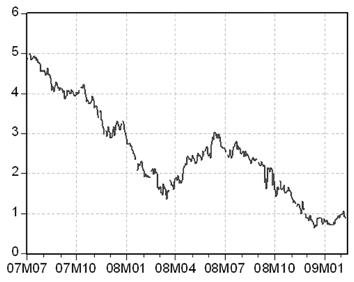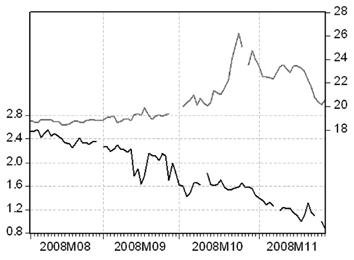Weird situations
The headline of the economy page in yesterday's Radikal daily was: "Contraction in Europe was far more than in the US that is responsible for the crisis". Under the headline, it was said that the economies of 15 EU countries using Euro contracted by 1.5 percent in average in the last quarter of 2008. On the other hand, the US economy contracted by 1.3 percent in the same period.
At the end of March, national income data for Turkey for the last quarter of 2008 will be announced. And it is doubtless that the pace of economic contraction in Turkey will be far more than that in the EU or the US. We will experience the same phenomenon when 'contraction' data for the first quarter of 2009 is announced.
This, let us call it a 'weirdness', is not specific for Turkey. A part of countries like Turkey also suffer from this weirdness.
This is not the only 'weirdness' that the global crisis created, there are also other ones. And the weirdest is that the bills issued by the US Treasury, at a time when the US fiscal markets are about to collapse, saw a huge demand.
Fiscal investors are competing to buy US treasury bills. As the demand for the bills increases, price of the bills increases. As prices of and the interest on bills move in opposite direction, interests on the US treasury bills move downwards.
Let me put a technical paragraph for the ones that are not familiar with the subject. Assume that, you bought a bill, for which you will receive 100 dollars when matures, from your bank (from the secondary market) for 90 dollars a year before the end of its maturity. When you keep the bill for one year and receive the 100 dollars as it matures, you earn 10 dollars. Therefore, the return (interest: 10/90) is 11.1 percent. However, if a lot of people want to buy that bill, the price might rise from 90 to 95 dollars. If you are determined to buy the bill, you will have to pay a higher price. Thus, the monetary return you will receive will be only 5 dollars corresponding to a interest return of 5.3 percent (5/95).
Therefore, when everything else affecting the interest rate is held constant, steep fall in the market interest rate for a bill means that the demand for it increases (price of it rises). Graph 1 shows the changes in the interest rate for two-year maturity US treasury bill in the secondary markets from July 2007 to January 2009. The rate has fallen down during a significant part of this period.
Of course, interest rate cuts by the FED also have impact on this development. However, everyone interested in the issue is aware that the main reason behind this fall is the actions of global financial investors called "escape towards quality". What is meant by 'escape towards quality' is the habit of selling the bills and similar financial assets issued by countries that seem riskier and buying financial assets issued by countries that seem less risky. In our example, the country considered less risky is the US, whose financial system is about to collapse!
With this respect, in the period where the crisis deepens, it will be interesting to compare the secondary market interest rates in Turkey and the US. Graph 2 makes this comparison for the period between the beginning of August 2008 and end of November 2008. The curve above with upwards trend (and the numbers on the vertical axis) show the movement of indicative bill interests in Turkey. The curve below shows the movement of two-year maturity US treasury bill interests. The movement is in direct opposite directions: The crisis emerges 'there' in the US and 'risk' rises here in Turkey!
While changing the design of the global financial system is discussed at G-20 meetings and other platforms, it will be useful to highlight this asymmetry: The ones that are relatively innocent are punished more, and this shall be prevented. Of course it is not possible to prevent the punishment by the market; however, what I am talking about is the need for the establishment of agencies that will compensate for the punishment.

Graph 1: Two-year maturity US treasury bill interest (secondary market, %)

Graph 2: Secondary market treasury bill interests: Turkey and US (indicative bill interest rate for Turkey, two-year maturity bill for US, %)
This commentary was published in Radikal daily on 15.02.2009




